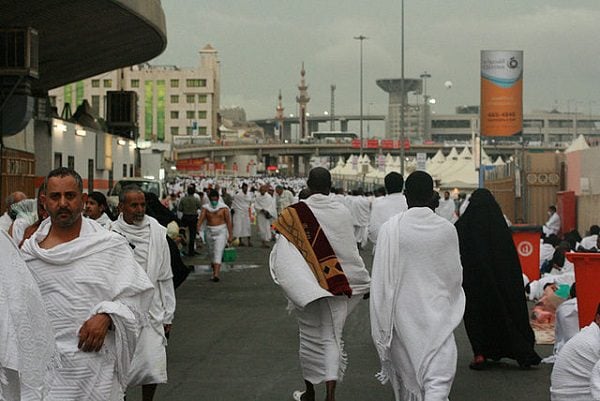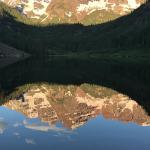
“Look – what I really need is a bag of saline solution with a tube and a needle.”
From his expression, I could tell that Dr. Fareed knew that it was a hopeless request. We were in the middle of a road outside of Mecca with hundreds of pilgrims marching past us. There was no way we were going to find an I.V. But an elderly woman suffering from heat stroke lay on the ground in front of us, so Yousef, a barrel-chested Egyptian American from the Midwest, ran off to see what he could find.
Dr. Fareed, a Pakistani American from New Jersey, returned to administering first aid.
I was in Saudi Arabia for the Hajj, the annual religious pilgrimage drawing millions of Muslims from around the globe. Our small group of Americans was among the thousands of pilgrims making the long walk from the tent city of Mina to the holy city of Mecca. We were hot, tired, and — after a night of sleeping under the stars — eager to return to our air-conditioned hotel.
Half my attention was focused on not getting separated from my group and the other half focused on prayer. Muslims believe that the days of Hajj are auspicious, and every moment spent in prayer carries special significance.
Suddenly, we encountered a commotion. A Muslim woman from China lay on the ground, unresponsive, with her elderly husband holding her head in his lap. A crowd of onlookers grew. A doctor in my group jumped in to help. “Heat stroke,” he said. As he administered care, the rest of us did what we could to help: We elevated her feet. We formed a human chain around the scene so that passersby would not crowd the woman. We comforted her husband. We brought water and small fans. We helped other pilgrims walk safely around the scene. We prayed.
Just when I feared the worst, she slowly regained consciousness. She moved her hands. She drank water. Whatever we were doing, it was working.
Yousef never did find the saline solution, but he did manage to find a wheelchair and a police officer. We all wanted to stay with the woman to make sure she made it safely to a hospital, but we knew that the duty had passed onto someone else. So, we paused to rest and then quietly continued our march to Mecca.
We did not discuss what had just happened, but I knew that my travelling companions had just help save a stranger’s life.
Since returning from Hajj last year, many people have asked me about the journey. What is the Hajj? What is it like? What do you do? How does it feel? Has it changed you?
The rituals of Hajj are the same for all pilgrims. The meaning, however, can be unique to each person.















